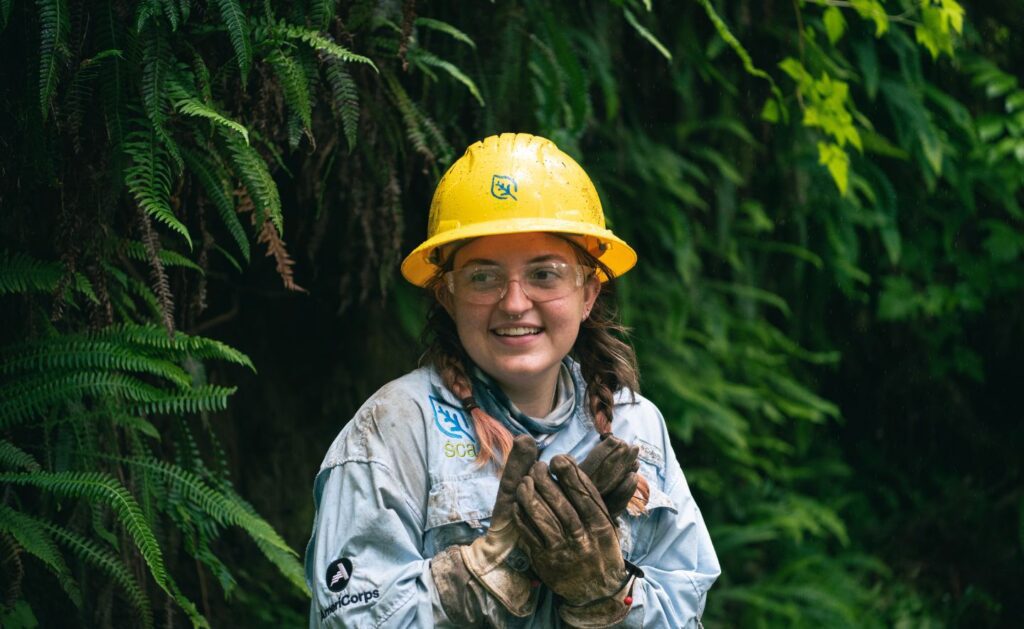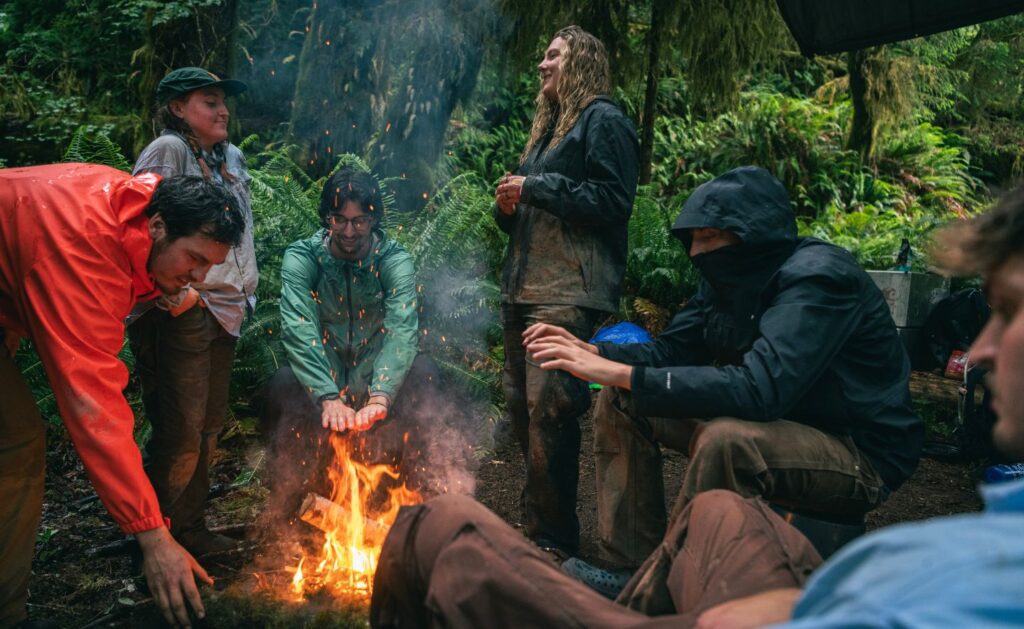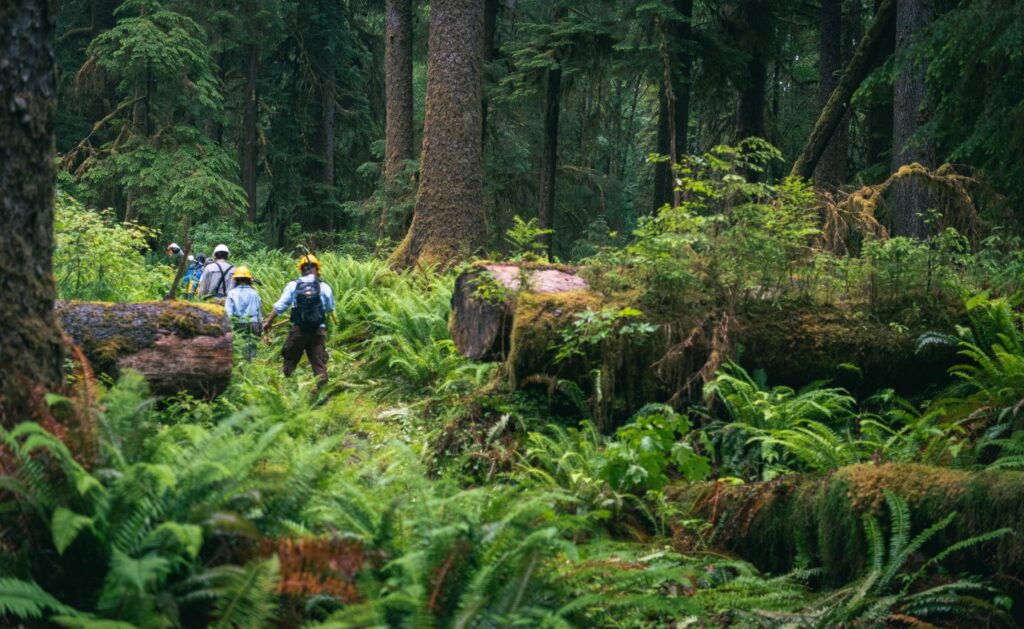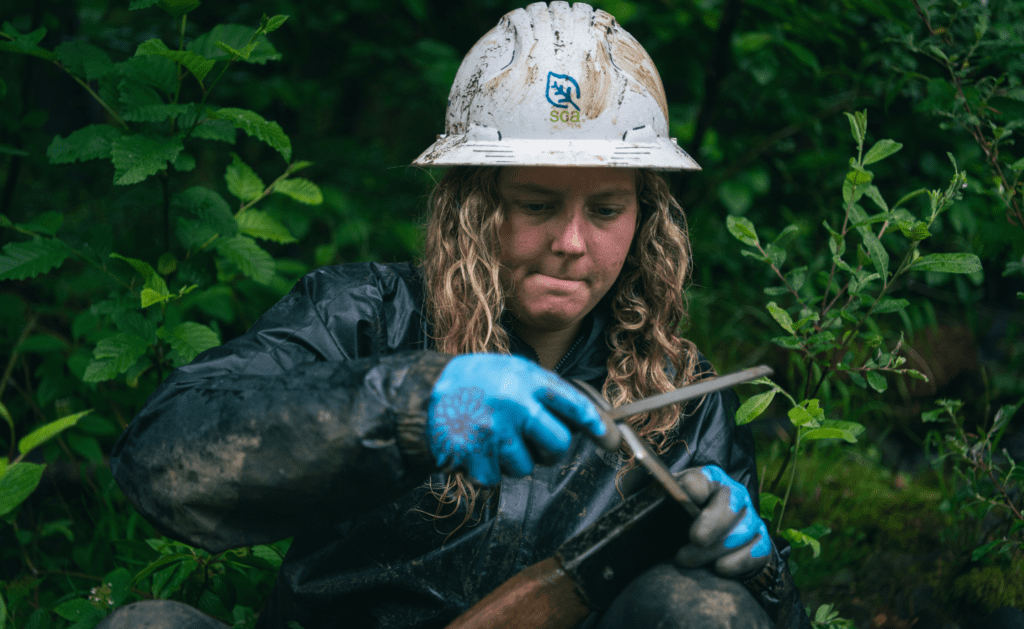As the sun rises over the Bogachiel Rain Forest Trail at Olympic National Park in Washington, the sound of sleeping bags and tent zippers unfurling joins the melodies of songbirds, the rustling of wind, and the ever-present pitter-patter of raindrops.
The SCA’s Olympic National Park Backcountry Trail Team has been hard at work here all summer. Working alongside National Park Service staff, the crew of 10 has been building bridges and turnpikes, retreading eroded and deteriorating trails, clearing brush and fallen trees, and creating memories for a lifetime.
“I think I’ve learned that I’m stronger than I think I am. When we hiked in [for this hitch], I was really struggling because it was farther than we went last time, and my pack was super heavy. The whole time, I was feeling like, ‘Ugh, I’m so weak, this is so hard, I’m struggling so much,'” said crew member Cale Sprouse of South Carolina. “But then only a few days went by, and it’s the exact same piece of trail, and it’s so much easier to go over. I’m walking like 8 miles a day, and it’s so easy.”

Olympic National Park Backcountry Team Member Cale Sprouse. “I think I’ve learned that I’m stronger than I think I am,” Sprouse said. (Photo Credit: Rafeed Hussain.)
Olympic National Park is where SCA founder Liz Putnam first enlisted student volunteers to assist with the upkeep of U.S. National Parks in 1957, launching the Student Conservation Association.
Today, the SCA is the largest provider of hands-on environmental conservation programs for youth and adults, with a mission to build the next generation of conservation leaders by engaging young people through hands-on service projects.
Throughout the program, the crew works exclusively in the backcountry, camping near their work sites. Each eight-day stretch, known as a hitch, is broken up by six rest days between assignments. As the crew moves along the trail, mules are sometimes needed to help carry their equipment over rough terrain.

SCA Olympic National Park Backcountry Trail Team warming up around a campfire. The crew works exclusively in the backcountry while living on the trail in the rainforest for weeks at a time. (Photo Credit: Rafeed Hussain.)
“Conservation isn’t really my niche, but I thought it’d be interesting. The line of work I’d like to go to involves planning greenways and bikeways,” said crew member Jalen Starks, of Chicago, who is studying urban planning at the University of Cincinnati. “A lot of times, when it comes to designing [urban] trails, a lot of fundamentals are missed, so I thought that being out here, actually helping with trail work, would give me better insight into designing those types of things.”
The work is grueling, and the elements are relentless. But like the many SCA program participants before them who have spent countless hours building and maintaining thousands of miles of trails across the country, this is what the crew came for.
“I just graduated from the University of Utah studying Environmental Studies, and I felt the call of trail work,” said crew member Truman Wisen. “Being a crew leader is understanding what it takes to feed 10 people for eight days and how to keep them all happy. It’s like being a dad and a therapist and a park ranger and Smokey Bear all rolled into one, I’d say, and a friend above all.”

SCA Olympic National Park Backcountry Trail team walks along Bogachiel Rain Forest Trail to their worksite. (Photo Credit: Rafeed Hussain.)
Crew member Campbell Melton, a junior at the University of North Carolina at Chapel Hill, was looking to gain more experience in conservation and learned of the SCA through his college advisor.
“I want to walk away with a lot more discipline for my work skills,” Melton said. “I think this will make me appreciate the little things a lot more, and I think it will really just help me in my everyday life. I feel like I can push my limit more out here.”
Crew members and leaders rely on a comprehensive two-week training program to do this work. During training, they learn team building, wilderness first aid, and conservation work skills, including chainsaw and crosscutting techniques, camping basics, backcountry meal preparation and more.
With this training, the crew has tackled more technical projects, such as building a retaining wall or a rock staircase and cutting massive felled and delimbed trees into logs.

Olympic National Park Backcountry Team Member Gracey Michaelis sharpens a tool while working along the Bogachiel Rain Forest Trail at Olympic National Park in Washington. (Photo Credit: Rafeed Hussain)
Working in the backcountry is some of the most challenging work SCA crews perform. These young adults from across the country live on the trail in a rainforest for weeks at a time, disconnected from the comforts of a roof, all while moving tons of earth every day.
Completing the program requires a certain level of grit and strength that comes with many lessons learned about the world around them and themselves.
“The world doesn’t end on 87th Street,” Starks said he would tell his 10-year-old self while growing up in Chicago. “We will see a lot more of the world than you expect.”
These moments of growth, reflection, and hard work are a testament to the decades-long legacy of the SCA, particularly the first Olympic National Park Team, which trekked into the
wilderness 67 years ago.
“[Liz] really put in the work to get some trail crews started, and she really pushed for women to be able to be part of it as well,” Sprouse said. “I would just like to thank her for everything.”
Your support helps us continue the legacy that began at Olympic National Park. Make a donation today to keep our SCA Team Members at work on the trail.